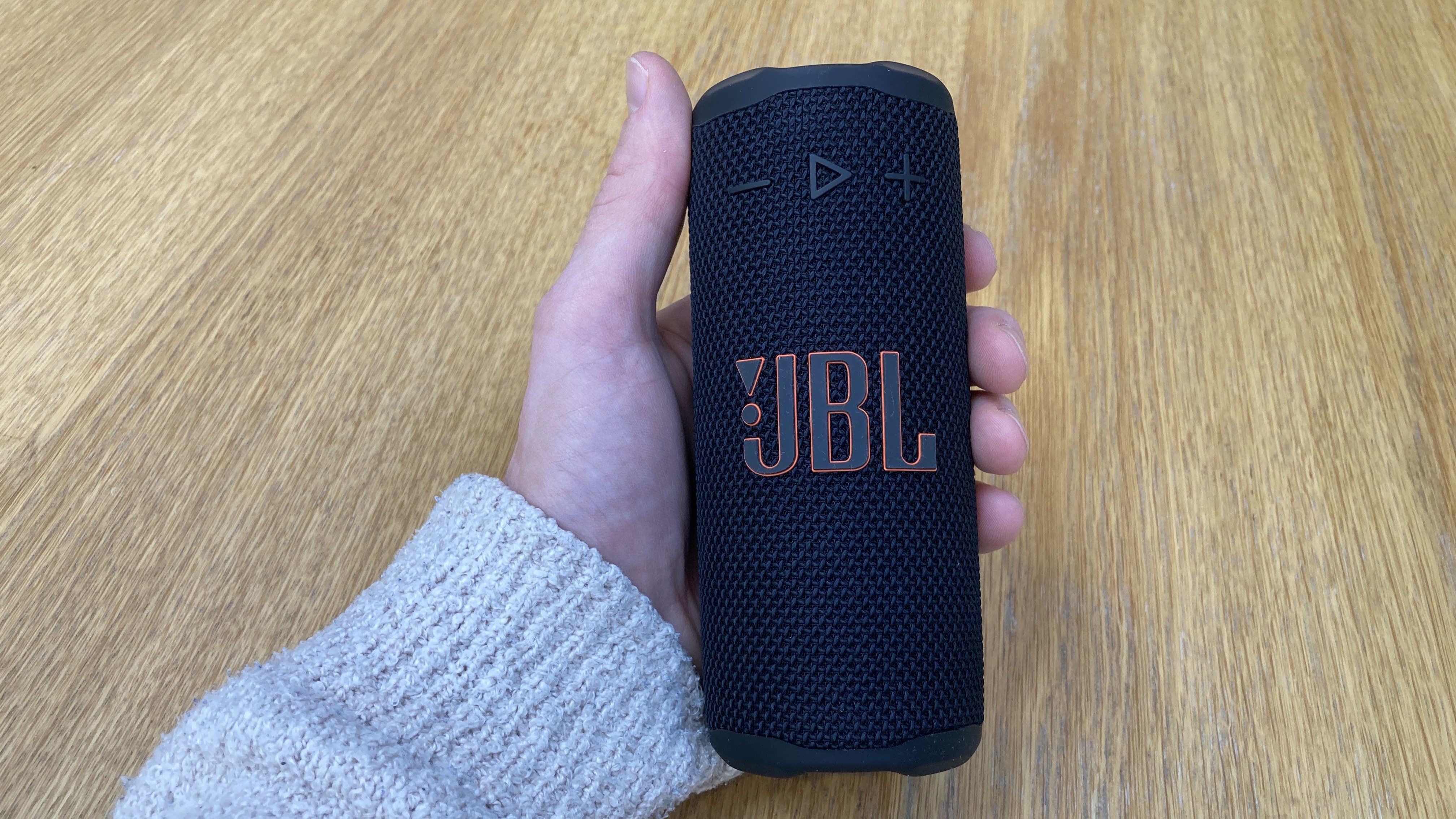What Hi-Fi? Verdict
Treat it with the same level of imagination Samsung has put into its design, and The Freestyle can be a surprisingly joyous device to live with and own
Pros
- +
Cute but practical design
- +
Bright, sharp, colourful pictures
- +
Impressive auto keystone/focus
Cons
- -
Below-par black levels
- -
Auto keystone system isn’t perfect
- -
A bit expensive
Why you can trust What Hi-Fi?
Despite only recently getting back into a home projection market it had previously been absent from for more than a decade, Samsung has already come up with something that genuinely breaks the mould.
Called The Freestyle, Samsung’s diddy new LED-based projector lives up to its name by enabling you to take projection to places it’s never really been able to go before. Literally. Even the usual power cable ‘tether’ doesn’t have to hold The Freestyle back from doing its thing in even the most inaccessible corners of your home.
While there’s no doubting that The Freestyle can do any number of things other projectors can’t, though, is it really anything more than a flight of fancy that should never have got further than the Soju-soaked Friday afternoon brainstorming meeting we can’t help but imagine it was dreamt up in?
Price
The Freestyle’s £999 / $900 / AU$1299 price is tricky to judge. On the one hand it feels a bit high for a product that, on the surface at least, appears to be much more about convenience than high-end performance. You can, for instance, get good quality dedicated home cinema projectors for hundreds of pounds/dollars less these days, while smart speakers – which is just one of the many other things The Freestyle claims to be – can be had for a tiny fraction of the price.
On the other hand, The Freestyle really is so uniquely versatile, so capable of playing its part in so many home scenarios and locations, and so different to every one of the hundreds of projectors we've reviewed previously, that it really does deserve to be seen as multiple products rolled into one. At which point it perhaps becomes decent value for households willing to embrace the entirety of what it can do.
Bear in mind that there is now a newer version of the Freestyle. While we haven't reviewed the 2023 edition, it's said to be very similar to this original model but with the addition of a couple of features such as the Samsung Gaming Hub and the ability to combine two projectors to create a larger, 21:9 image.
Design
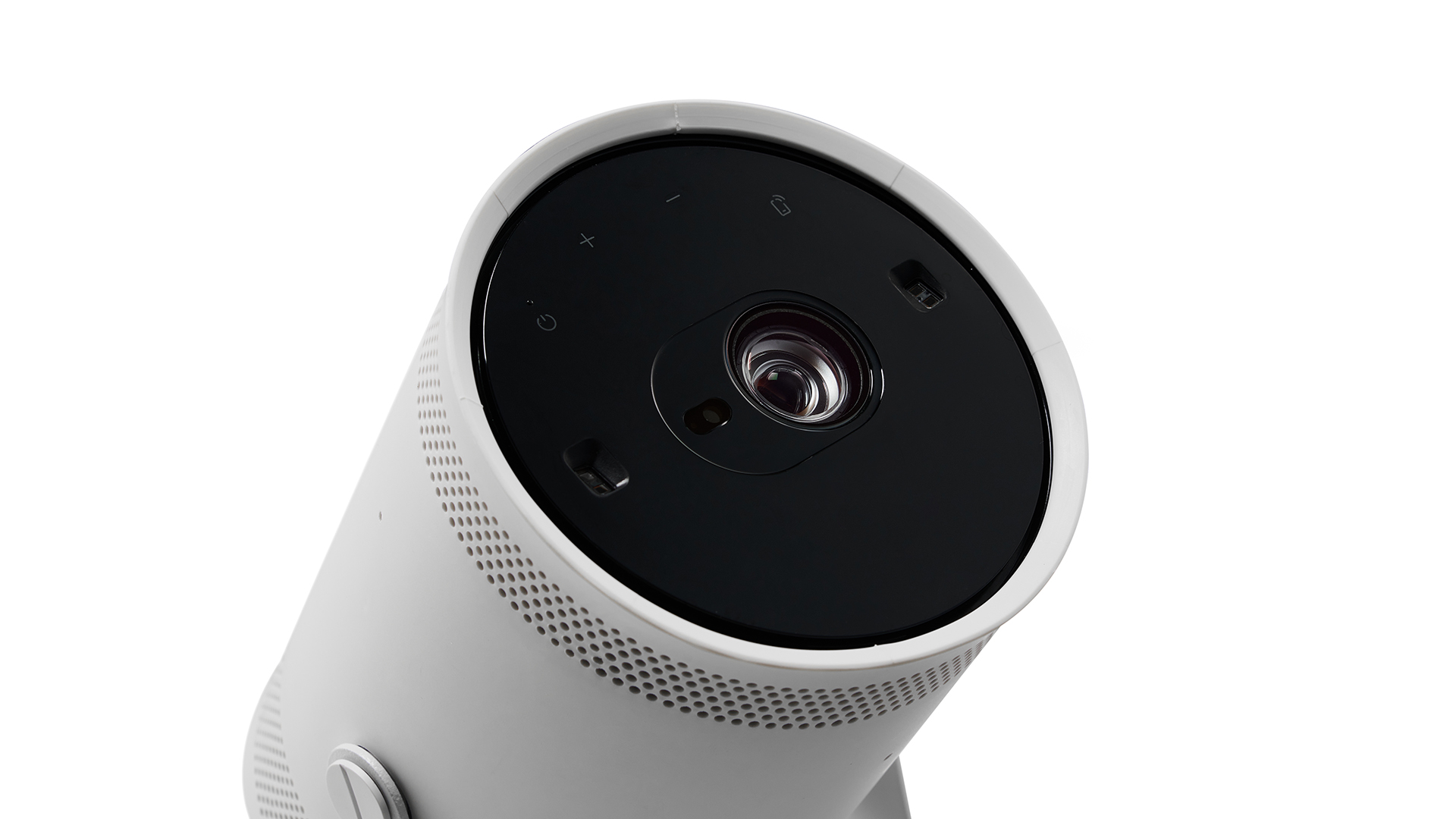
Anyone expecting The Freestyle to be another boring rectangular projector box is in for a shock. For starters, the main bodywork is shaped like a small barrel – or a large can of baked beans, if that’s a better frame of reference for you. What’s more, the barrel section is mounted within an external frame using two hinged attachments, upon which the whole barrel can be rotated round through a full 180 degrees.
The latest hi-fi, home cinema and tech news, reviews, buying advice and deals, direct to your inbox.
This support frame sits on a circular base that supports the weight of the main projector with plenty of stability, no matter what angle the projector is resting at.
The idea behind the rotating mechanism is that it lets you more or less effortlessly adjust the angle of projection to pretty much whatever you like. So no matter how low or high a table it's sitting on, you can get the image to appear in exactly the place on your wall you want. The tilt feature means you could even project onto the eaves of a loft room; a vaulted ceiling; or even a flat ceiling right above your head if you rotate the projector through 90 degrees. So now you can watch TV in bed without even having to sit up.
The Freestyle ships in a fetching, minimalist white finish, but in keeping with its ‘all things to all people’ appeal, other colours are available.
There are two connections on the Freestyle’s side: one for attaching a provided USB power cable, the other a mini HDMI for attaching external sources. Note that no HDMI to mini HDMI adaptor is included.
What is included, though, is a prismatic lens cover. This can be attached to both protect the lens and, rather groovily, turn the projector into an ambient lighting device by diffusing whatever images you’re playing through the projector. Samsung helpfully provides a series of both still and animated images in the projector’s memory banks to help you change the quality and mood of the light the prismatic lens casts out.
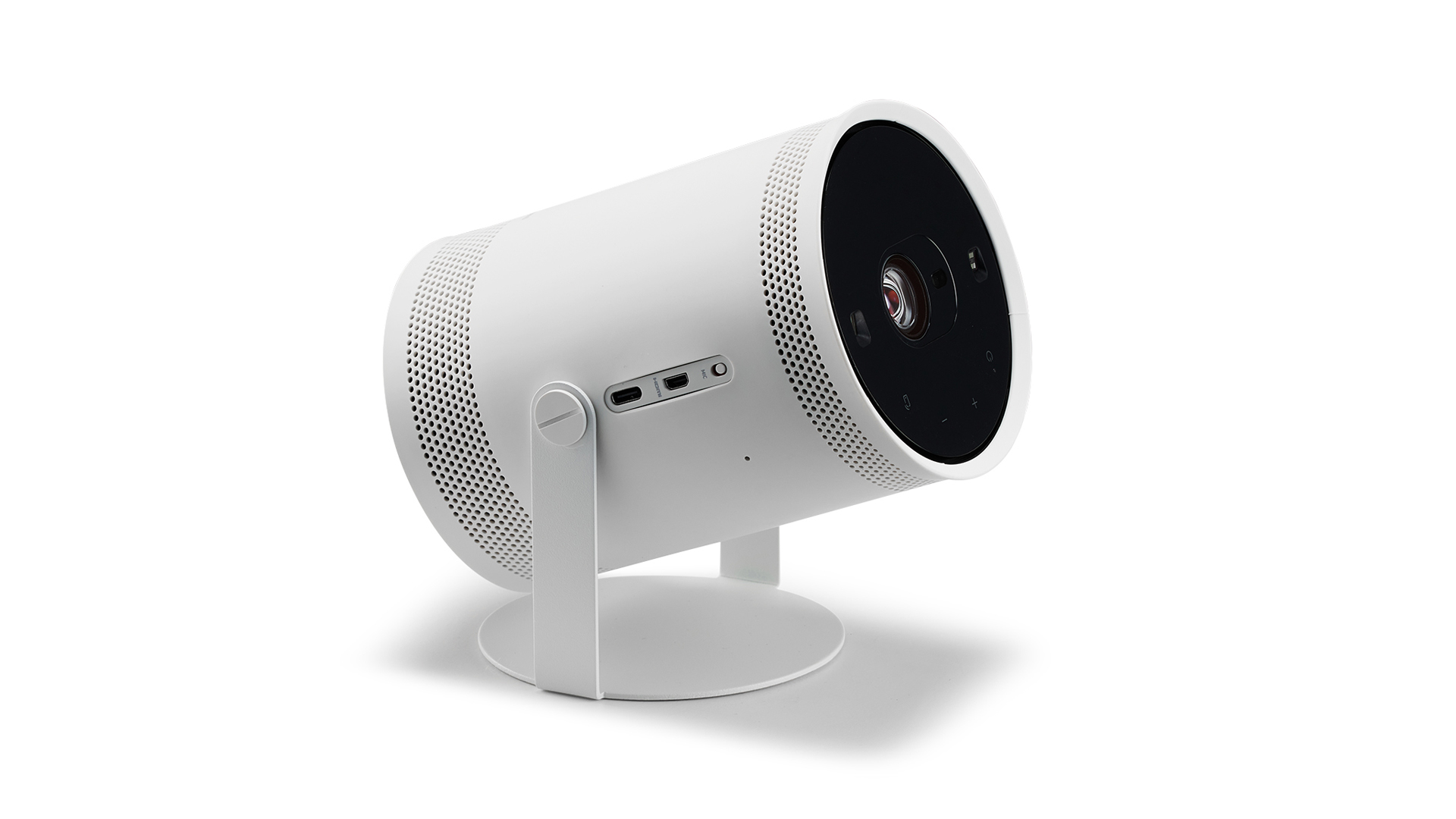
Dimensions 17 x 10 x 9.5cm
Screen size Up to 100 inches
Native resolution 1920x1080
Input in game mode 44ms
Projector type DLP/LED Pico lighting
A ring of perforations running right around a sliver of the projector’s upper bodywork points to another key feature of The Freestyle: a built-in 360-degree sound system. This is claimed to not only provide a more satisfying accompaniment to movie, game and TV playback than most built-in projector sound systems, but also enable The Freestyle to be used as a standalone smart speaker.
As yet more evidence that The Freestyle’s design is much more intimately associated with its features than most products, Samsung already provides a wide range of accessories for it, all designed to open up more potential use scenarios. You can, for instance, get a battery pack that the base sits on and which allows you to use The Freestyle anywhere you like, even if there’s no plug socket nearby.
There’s also a showerproof carry pouch available, advancing its potential in conjunction with the battery pack as a potentially great option for taking on camping trips (you could perhaps tilt it to project up onto a typical tent’s angled sides), and there’s even a mounting option that lets you fit The Freestyle into a standard light fitting.
All in all, by the time you’ve factored in the accessories already available for it, it’s hard to think of any other product in recent times that offers such a perfect combination of form and function.
Features
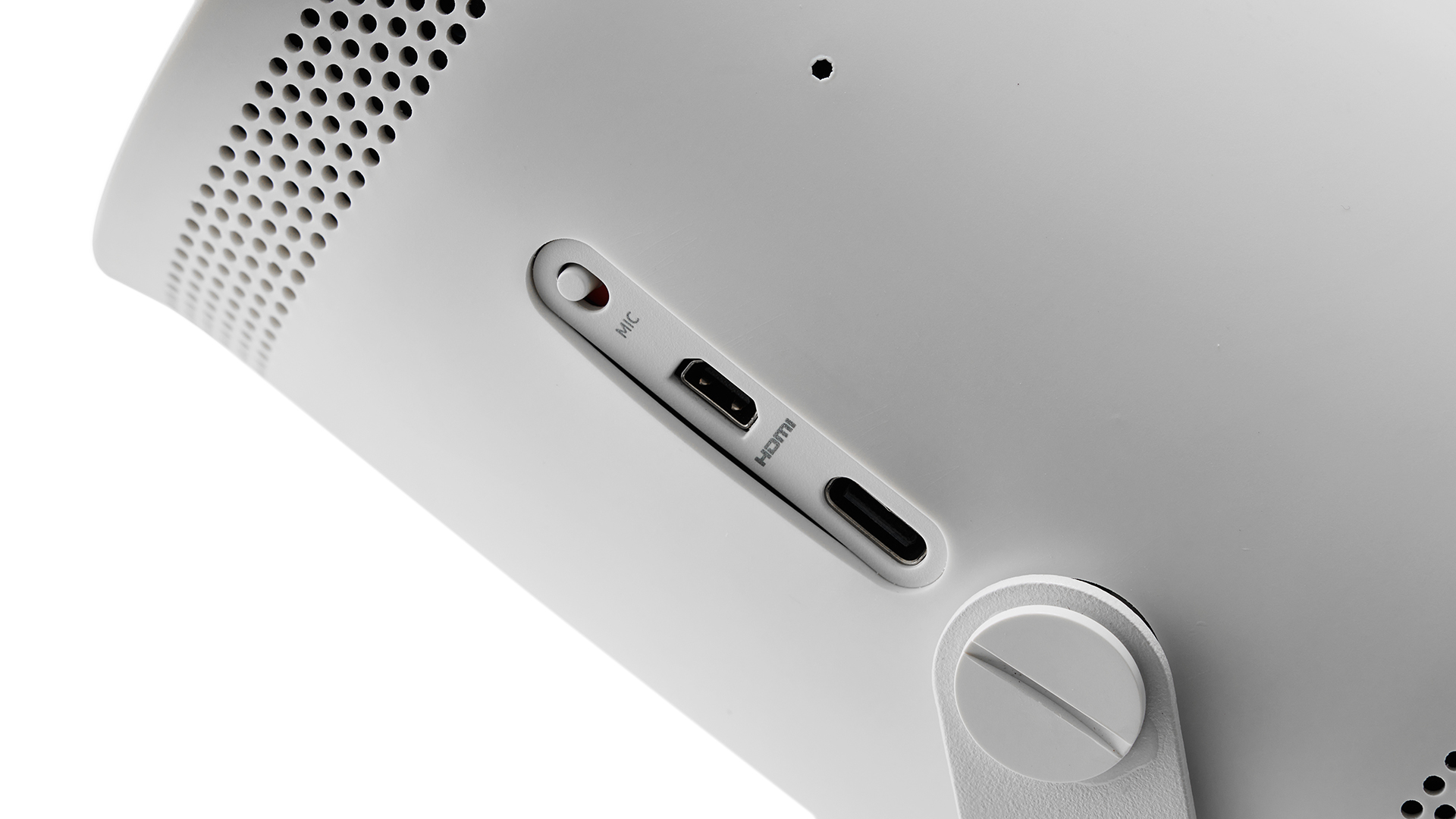
The unique way in which The Freestyle’s design intersects with its features list means we’ve already covered many of the things that make it special. There are still a few more tricks up its sleeve, though, starting with the fact that it carries built-in wi-fi and a fully fledged smart TV system.
In fact, it uses essentially the same new Tizen-based system we’re about to see on Samsung’s 2022 television sets, complete with a comprehensive suite of video streaming apps (including the big hitters of Netflix, Amazon Prime Video, YouTube, Disney+, Apple TV+, and the catch up services for all the big terrestrial broadcasters).
The Freestyle can also be controlled using your voice via Samsung’s Bixby system – something that’s especially important to its smart speaker aspirations given that voice control is such a key facet of the smart speaker world.
Its audio credentials find the 360-degree ring of sound mentioned earlier fed by 5W of amplification. That doesn’t sound a lot, it has to be said, but the circular dispersion should help.
The Freestyle’s ability to play streamed content joins with its optional battery pack in potentially making it a truly cable-free video display in a way that other projectors – or portable TVs – can only dream of. Being able to just pick The Freestyle up in one hand in one room and carry it straight into another room without having to trail a power cable round or position the projector near a plug socket is truly liberating.
You can also easily wirelessly connect your phone or tablet to The Freestyle using Samsung’s Smart Things platform – or even, if you have a recent Samsung phone, by just tapping it against the projector’s bodywork.
The magic of The Freestyle’s potential power cord-free ‘move and play’ experience (if you buy the optional battery) would be reduced massively, though, if you had to spend ages setting it up again every time you moved it. Happily, Samsung has got this covered in the shape of mostly remarkable auto keystone and auto focus systems. Simply put the projector where you want it, tilt it to the required angle, and then the projector will work out by itself how to straighten the image's sides and get the focus right.
This keystone correction works with both offset vertical and horizontal projection angles, and the range of angles it can correct for is startling.
Obviously the keystone correction in play here is digital rather than optical, meaning that the projector is digitally manipulating the image so that it can no longer deliver pixel for pixel playback of full HD sources.
This digital adjustment works well, though, leaving pictures still looking sharp and polished. And in any case, in a product as convenience-driven as The Freestyle, successful automated set-up seems much more important than maybe being able to get an extra smidge of performance.
There’s no optical zoom available on The Freestyle, so the image size it can produce depends on how far it’s placed from your projection surface of choice. To give you some idea of what’s possible in this respect, it can produce a 30-inch picture from a throw distance of just 80cm, or a 100-inch image from 2.5m.
The Freestyle’s optical system is a Pico projector-style DLP system illuminated by LED lights. The use of LEDs means you don’t have to wait ages for the projector to warm up and cool down, and the LEDs are claimed to last more than 20,000 hours. So there’s no need to regularly replace lamps as you do with most regular, full-sized projectors at this sort of price.
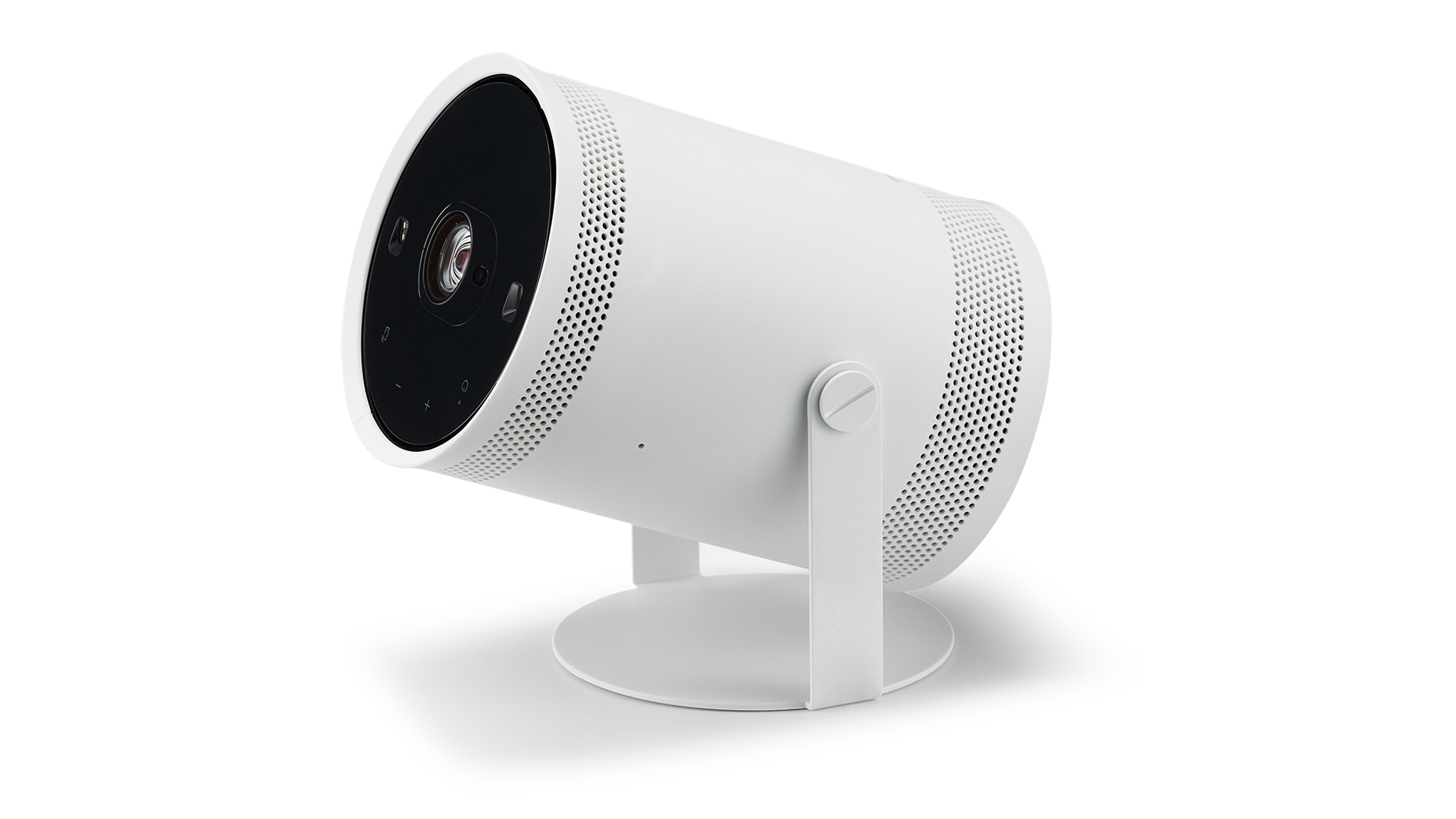
The Freestyle carries a native 1080p resolution and, surprisingly, is able to support HDR playback in the HDR10 and HLG flavours. This works fine with streamed services – but we did find an issue with the HDMI (confirmed by Samsung) where the Xbox Series X wouldn’t see the projector as HDR capable, and so would only output its games in SDR. Panasonic and Oppo 4K Blu-ray players all deliver HDR to The Freestyle correctly during testing, but Samsung’s own (admittedly now ageing) 4K Blu-ray players won't. Bear in mind that The Freestyle’s approach to HDMI means there may be other sources out there that won’t play on it in HDR even when you think they should.
Tucked away in The Freestyle’s menus is a decent selection of set-up aids, including a flexible manual keystone adjustment and the debut appearance of Samsung’s EzCAL automatic calibration system, which lets you use your phone’s camera and a new Samsung app in conjunction with various test screens to optimise its performance to suit your room. In truth, though, it’s hard to see many people spending much time with these sorts of tools with a product as built around ease of use and instant gratification as The Freestyle.
That said, while the auto keystone correction system is very clever and usually works well, just occasionally it seems to get stuck in a rut, not adjusting the image in the way it normally would. And when that happens, we found that activating the manual keystone adjustment menu and then deactivating it again can suddenly trigger the automatic system to wake up again.
Picture
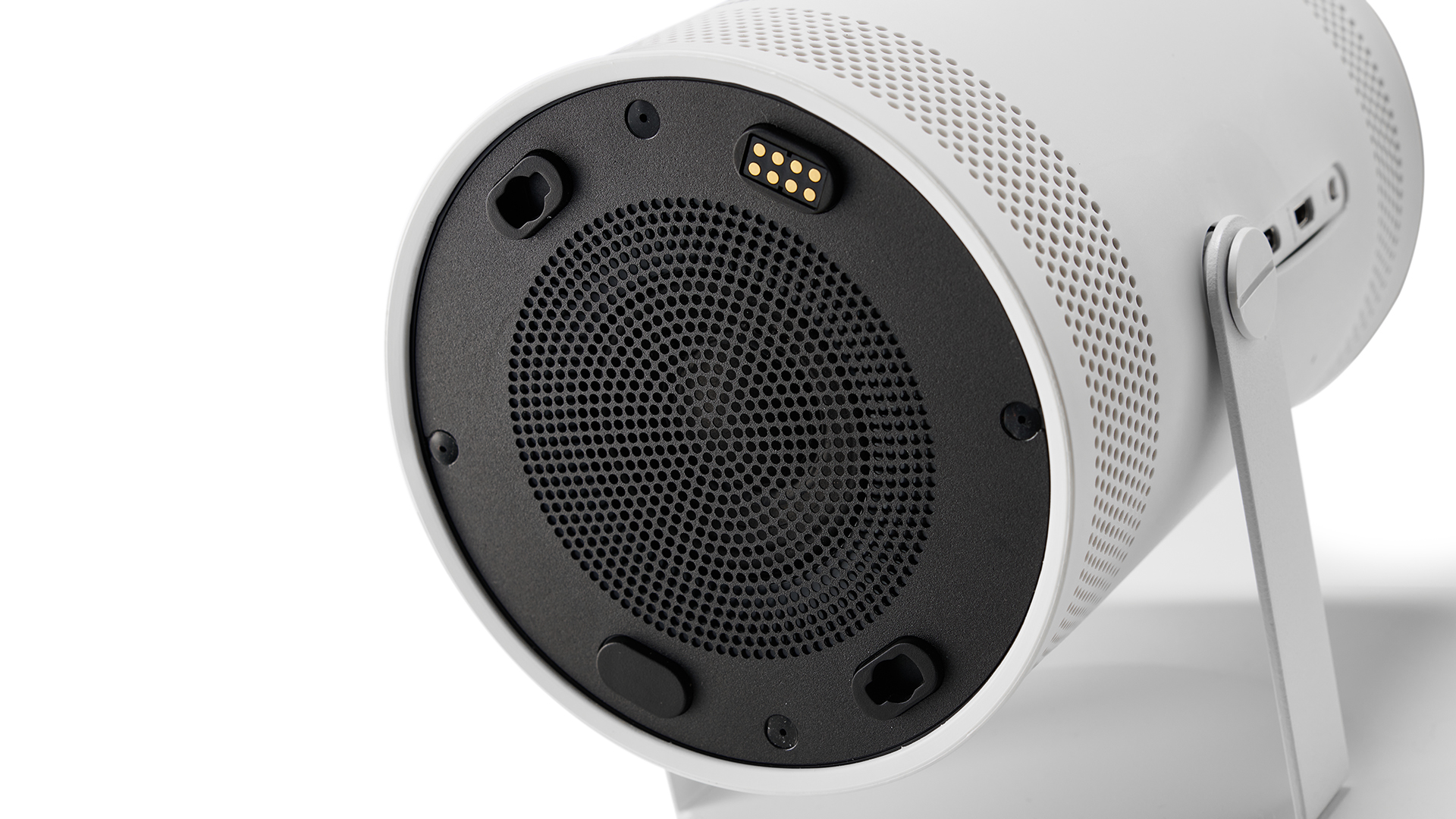
Ultra portable projectors typically struggle for brightness. Thankfully given the sort of usage scenarios Samsung envisages for it, though, The Freestyle delivers enough shine (Samsung quotes 550 LED Lumen peaks) to punch quite handily through typical levels of ambient light. Especially if you’re happy to stick with an image of 70 inches or less, rather than trying to stretch things out to a duller-looking 100 inches.
This brightness is crucial, as most people won’t want to have to fully darken every room they want to use The Freestyle in. That said, if you do find yourself using it in a relatively dark environment, its surprising brightness for such a small projector also helps it deliver an unexpectedly enjoyable sense of HDR’s advantages over SDR.
Obviously we’re not talking about anything like the sort of light range you can get from a TV, even if you keep the projector’s image quite small. But our initial expectations that The Freestyle’s HDR support may prove to be at best pointless and at worst actually damaging to its performance prove unfounded.
The brightness is supported by engagingly punchy colours. They maintain fulsome saturations up to the projector’s maximum brightness, and they’re strong enough with the projector’s brightness behind them to hold out against even quite high levels of room light.
While some people might (rather unreasonably, we’d say) be wishing The Freestyle was a 4K projector, its pictures don’t look at all soft or lacking in detail. On the contrary, there’s a real snap to good quality HD sources that’s backed up by plenty of subtle texturing and some surprisingly subtle colour renditioning. The sharpness holds up equally well with both PC/gaming and video sources, too, without looking forced or noisy in either case.
The Freestyle carries an optimised version of the motion processing Samsung uses on its latest TVs, and so long as you use this on a relatively mild Custom setting it can help the sharpness hold up even during action scenes or camera pans thanks to some gentle but effective judder reduction.
All in all, The Freestyle does enough with its picture quality to fulfil its relatively casual brief more successfully than expected, considering that it’s a debutante in what feels like a whole new product category.
There are, though, probably inevitably, a couple of picture flaws to take on board. First, black levels are very average. Not by the standard of other ‘pocket’ projectors, perhaps, but there’s certainly a more pronounced grey pall hanging over dark scenes than you get with good sub-£1k full-sized projectors. Especially if you’re watching a mostly dark HDR image that has a few bright highlights in it.
Thankfully this greyness doesn’t stop The Freestyle from reproducing a decent level of shadow detail in dark areas. But if you were hoping that the projector’s casual cred might convert into something truly cinematic for serious movie nights, you need to think again.
The other issue is that while the picture looks sharp and detailed, you can sometimes make out faint visible pixel structure in the image at large image sizes, especially with gaming and PC sources.
Sound
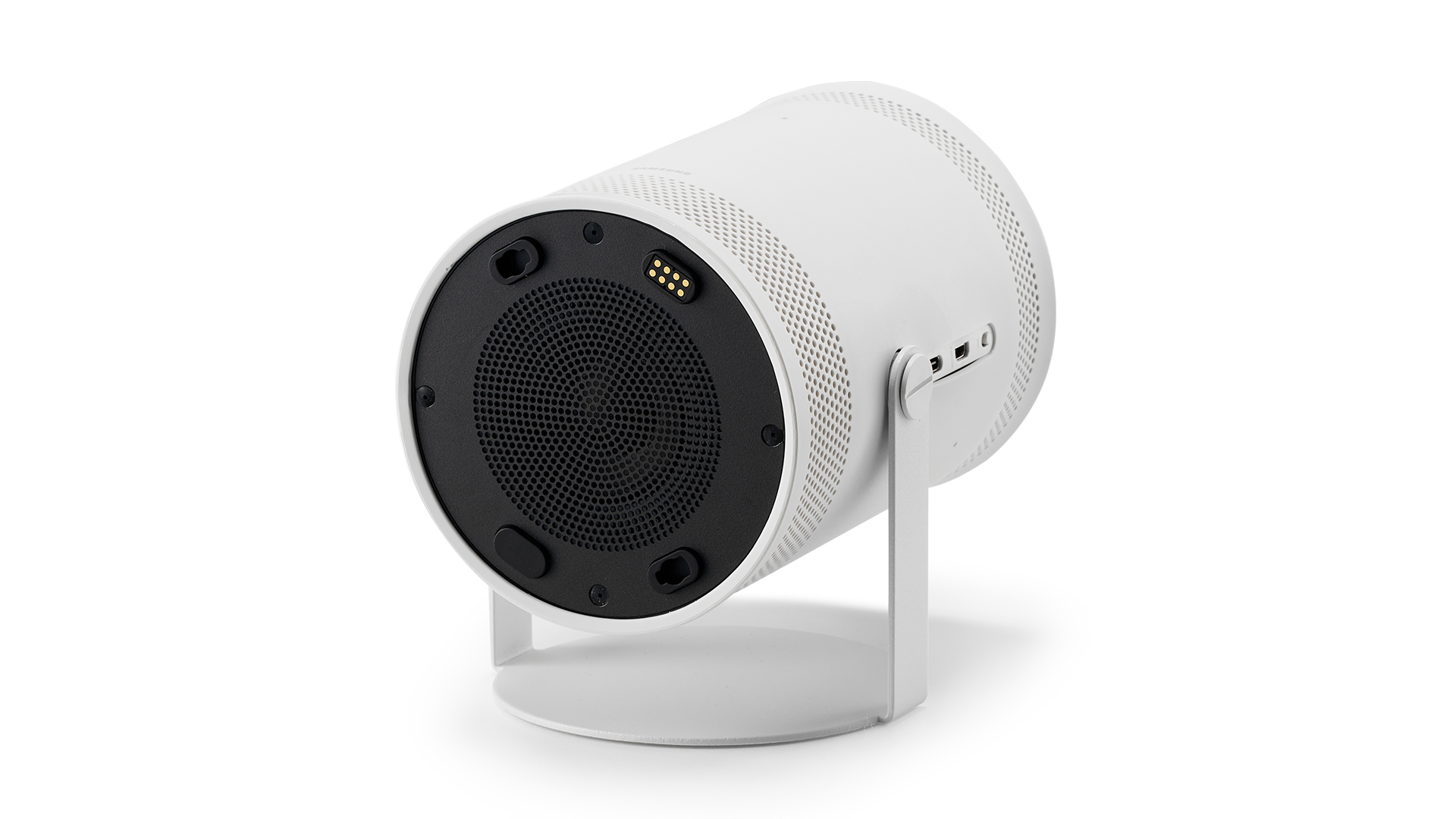
While The Freestyle is inevitably no threat to the finest, more dedicated smart speakers we’ve had on our test benches over the years, it also sounds better than anticipated. The 360-degree dispersion of its sound helps it create a sound stage that exists far beyond the projector’s petite form, and adapts surprisingly effectively to both music and movie sources.
With films, the Movie mode creates a detailed, enjoyably layered soundstage that’s cast far enough from the projector’s bodywork to sound less dislocated from the onscreen action than is usual with built in projector sound systems. There’s a decent amount of bass on tap too, despite The Freestyle having so little power and so little physical space to play with.
This bass underpins The Freestyle’s music playback tidily too, with good timing and balance. There isn’t much sense of traditional stereo staging; instead the sound seems to emanate out from a single central point. Also, while simple pop sounds enjoyable, denser classical or rock tracks can sound a little boxed in. It sounds just good enough overall, though, to justify its “I’m a smart speaker as well as a projector” claims.
Verdict
The Freestyle doesn’t totally sidestep the old ‘jack of all trades, master of none’ adage. It won’t really satisfy home cinema fans, and you will need to take pretty regular advantage of its many features to justify its cost.
The sheer extent of its flexibility actually makes its performance feel better than we arguably have any right to expect, though. So if you’re prepared to show it the sort of love it needs, the Freestyle has the potential to be your home’s new best friend. Right up until the point where you end up squabbling over whose turn it is to use it, anyway.
SCORES
- Picture 3
- Sound 3
- Features 5
MORE:
Read our review of the Epson EH-TW7000
Also consider the Epson EF-12
Read our thoughts on the BenQ W2700
Best projectors 2022 with Full HD, 4K, portable and short throw
What Hi-Fi?, founded in 1976, is the world's leading independent guide to buying and owning hi-fi and home entertainment products. Our comprehensive tests help you buy the very best for your money, with our advice sections giving you step-by-step information on how to get even more from your music and movies. Everything is tested by our dedicated team of in-house reviewers in our custom-built test rooms in London, Reading and Bath. Our coveted five-star rating and Awards are recognised all over the world as the ultimate seal of approval, so you can buy with absolute confidence.

